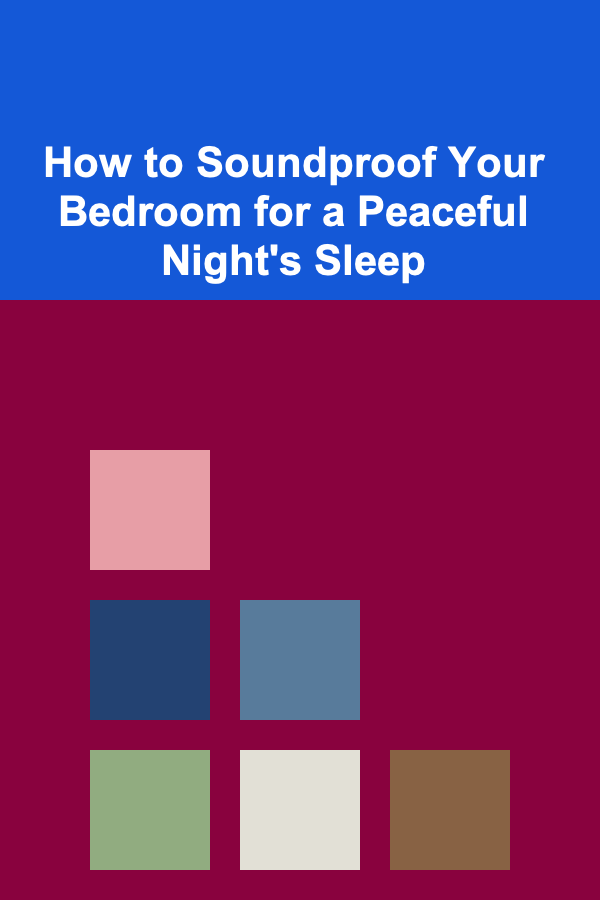
How to Soundproof Your Bedroom for a Peaceful Night's Sleep
ebook include PDF & Audio bundle (Micro Guide)
$12.99$8.99
Limited Time Offer! Order within the next:

A peaceful night's sleep is one of the most fundamental aspects of good health and well-being. However, in our increasingly noisy world, getting a good night's sleep has become more challenging than ever. Noise from traffic, neighbors, street sounds, or even household noises can disrupt your sleep, leaving you feeling tired and unrefreshed the next morning.
Soundproofing your bedroom is one of the most effective ways to create a serene environment that promotes deep and restorative sleep. This article explores how to soundproof your bedroom, discussing different techniques, materials, and strategies you can use to block out unwanted noise, reduce sound reflection, and improve the overall acoustics of your sleeping space.
Understanding the Impact of Noise on Sleep
Before diving into the specifics of soundproofing, it's important to understand the impact that noise can have on your sleep and overall health. Research has shown that noise pollution can significantly disrupt sleep patterns and impact the quality of your rest. Here are some ways in which noise affects your sleep:
- Disruption of Sleep Stages: Sudden or loud noises can cause people to wake up or shift between sleep stages. This disruption prevents you from achieving the deep, restorative sleep your body needs.
- Increased Stress Levels: Chronic exposure to noise has been linked to higher levels of cortisol, a stress hormone that can make it more difficult to relax and fall asleep.
- Decreased Sleep Duration: People who are exposed to noise at night may sleep for shorter periods, leading to a cumulative sleep debt that affects physical and mental health over time.
- Negative Impact on Mental Health: Inadequate sleep caused by noise pollution has been associated with increased risks of anxiety, depression, and irritability.
Given these effects, it's clear that taking steps to soundproof your bedroom can be an important investment in your well-being.
Common Sources of Bedroom Noise
Before you start soundproofing, it's helpful to identify the types of noise that are disturbing your sleep. Common sources of bedroom noise include:
- Traffic Noise: If you live near a busy street or highway, the sound of cars, motorcycles, and other vehicles can seep into your bedroom, especially at night when the ambient noise levels are lower.
- Neighbors: Noisy neighbors can be a significant source of disturbance. Sounds like footsteps, conversations, music, or even loud appliances can easily travel through walls and ceilings.
- Street Noise: In urban areas, sounds from pedestrians, public transportation, sirens, and general city activity can create a constant background hum that interferes with sleep.
- Indoor Noises: Household sounds, such as a ticking clock, the hum of an air conditioner, or the clinking of dishes, can also disturb your sleep if the bedroom is not properly soundproofed.
- Sleep Environment Noises: Sometimes, the sounds of your own environment, such as snoring or the noise of a partner's movement, can disrupt your rest.
Effective Strategies for Soundproofing Your Bedroom
Now that we have a better understanding of the types of noise that can affect your sleep, let's explore some of the most effective strategies for soundproofing your bedroom.
1. Seal Gaps and Cracks
One of the first and most cost-effective ways to soundproof a room is to seal any gaps or cracks that may be letting sound in. Sound waves can travel through even the smallest openings, so addressing these issues is crucial. Here's how to do it:
- Door Gaps: Check for gaps around the door frame. These gaps can be filled using weatherstripping tape or door sweep seals, which are available at most hardware stores. A door sweep can be attached to the bottom of the door to block sound from entering beneath it.
- Window Gaps: Windows can be a significant source of noise leakage, especially if they're old or poorly sealed. You can improve the soundproofing of your windows by using weatherstripping or caulking to seal any gaps around the frame. Alternatively, consider installing double-glazed windows or acoustic window inserts for better sound isolation.
- Wall Cracks and Joints: Inspect the walls for any visible cracks or joints. Use acoustical sealant to fill these gaps. This sealant remains flexible and helps to reduce the transmission of sound through the walls.
2. Use Heavy Curtains or Acoustic Drapes
One of the simplest and most affordable ways to reduce noise coming through your windows is to install heavy curtains or acoustic drapes. These specialized curtains are designed to absorb sound and block out external noise. They are particularly useful for reducing noise from traffic, street sounds, and even noisy neighbors.
When choosing curtains, look for fabrics such as velvet, suede, or other dense materials that have sound-dampening properties. For maximum soundproofing, ensure that the curtains cover the entire window, including the sides and bottom, to prevent sound from sneaking in through any gaps.
3. Install Acoustic Panels or Foam
Acoustic panels are an excellent solution for reducing sound reflections and absorbing unwanted noise. These panels are usually made from materials such as foam, fiberglass, or mineral wool, which are effective at absorbing sound waves. Here's how to use them:
- Wall Panels: Mount acoustic panels on the walls, especially in areas where sound tends to reflect, such as the walls adjacent to noisy neighbors or outside areas. The panels will absorb the sound before it bounces back into the room.
- Ceiling Panels: If you're hearing noise from above (such as footsteps or loud music from neighbors), installing acoustic panels on the ceiling can help dampen these sounds. You can also add mass-loaded vinyl (MLV) under the ceiling to block noise transmission.
- Foam Panels: Foam panels are an inexpensive and easy-to-install option. They come in various shapes and sizes, and they're particularly effective at absorbing mid- to high-frequency sounds. Place them around the room to reduce reverberation and echo.
4. Add Soundproof Flooring
Floors can be a significant source of noise, especially if you live in an apartment or a multi-story building. Sound travels easily through hard surfaces like wood, tile, or laminate. Fortunately, there are a variety of ways to soundproof your floor.
- Carpet and Rugs: One of the easiest ways to reduce sound transmission through the floor is by adding carpets or rugs to the room. Thick carpets with padding underneath are highly effective at dampening sound, especially impact noises like footsteps.
- Soundproof Underlayment: If you want a more permanent solution, you can install a soundproof underlayment beneath your flooring. This material acts as a barrier to sound, preventing it from traveling through the floor. It's particularly useful for rooms with hardwood, laminate, or tile flooring.
- Mass-Loaded Vinyl (MLV): Another effective flooring solution is to install MLV, a dense material that adds mass to the floor and helps block sound. This can be used under carpets or beneath the flooring itself.
5. Use Soundproofing Doors
The doors in your bedroom play a crucial role in soundproofing the space. Hollow-core doors are common in many homes but are not very effective at blocking sound. Consider replacing your existing door with a solid-core door, which is denser and better at preventing sound from entering or leaving the room.
If replacing the door isn't an option, you can improve its soundproofing by sealing any gaps around the frame and adding a door sweep to block sound from passing underneath. Additionally, you can use a door seal kit, which is designed to fill any gaps and improve the overall sound isolation of the door.
6. Use White Noise Machines or Earplugs
While physical soundproofing measures can significantly reduce noise, they may not completely eliminate all external sounds. In such cases, white noise machines or earplugs can be effective supplementary tools.
- White Noise Machines: These machines create a consistent background noise that masks disruptive sounds. White noise can be particularly useful for blocking out traffic, conversations, or other irregular noises that would otherwise interrupt your sleep. Choose a machine that offers adjustable volume and sound options, such as ocean waves or rainfall, to create a calming atmosphere.
- Earplugs: If the external noise is particularly persistent, earplugs can be an easy and effective solution. High-quality earplugs can reduce a significant amount of sound and are particularly useful if you're sensitive to noise or live in an environment with constant disturbances.
7. Create a Soundproofed Sleep Area
In some cases, it might not be enough to soundproof the entire room. If noise from outside is the primary issue, consider creating a dedicated sleep area within the room. You can set up a canopy or curtain divider around your bed, creating an enclosed space that helps absorb sound. This can be particularly effective if you're dealing with noise coming from outside the window or from other parts of the house.
Additionally, if you sleep with a partner or have pets that make noise during the night, a soundproofed sleep area can help block out those sounds and provide a quieter, more comfortable space for rest.
Conclusion
Soundproofing your bedroom is an effective way to create a peaceful environment conducive to a good night's sleep. By addressing the sources of noise, sealing gaps, and using sound-absorbing materials, you can significantly reduce the disturbances that prevent restful sleep. Whether through sealing cracks, using acoustic panels, adding heavy curtains, or investing in soundproof flooring, there are a variety of strategies that can help you achieve a quieter, more serene sleeping environment.
With the right approach, soundproofing can transform your bedroom into a peaceful sanctuary, allowing you to enjoy deep, undisturbed sleep every night.
Reading More From Our Other Websites
- [Personal Care Tips 101] How to Keep Up with Personal Care While Traveling: Tips for Busy Travelers
- [Reading Habit Tip 101] Best Approaches to Combine Reading & Journaling for Enhanced Self‑Reflection and Learning
- [Home Renovating 101] How to Make Your Home Renovation Kid-Friendly and Safe
- [Digital Decluttering Tip 101] From Chaos to Order: A Weekly Routine for Keeping Your Digital Life Clean
- [Stamp Making Tip 101] Design-It-Yourself: Turning Hand-Drawn Art into Perfect Stamps
- [Reading Habit Tip 101] The Joy of Getting Lost: How Reading for Pleasure Boosts Creativity
- [Home Security 101] How to Set Up Motion Detectors for Effective Home Security
- [Home Staging 101] How to Stage Your Home's Dining Room for a Welcoming Feel
- [Simple Life Tip 101] Best Mindful Breathing Exercises to Ground a Hectic Simple‑Life Routine
- [Personal Care Tips 101] How to Remove Nail Polish Without Making a Mess

How to Create an Organized Travel Packing System
Read More
How to Redecorate Your Living Room Without Breaking the Bank
Read More
How to Use LED Lights to Save Money and Energy
Read More
How to Use Storage Bins for School Supplies
Read More
10 Tips for Directing Documentary Films: A Beginner's Guide
Read More
How to Create a Custom Sewing Kit Checklist for Different Projects
Read MoreOther Products

How to Create an Organized Travel Packing System
Read More
How to Redecorate Your Living Room Without Breaking the Bank
Read More
How to Use LED Lights to Save Money and Energy
Read More
How to Use Storage Bins for School Supplies
Read More
10 Tips for Directing Documentary Films: A Beginner's Guide
Read More